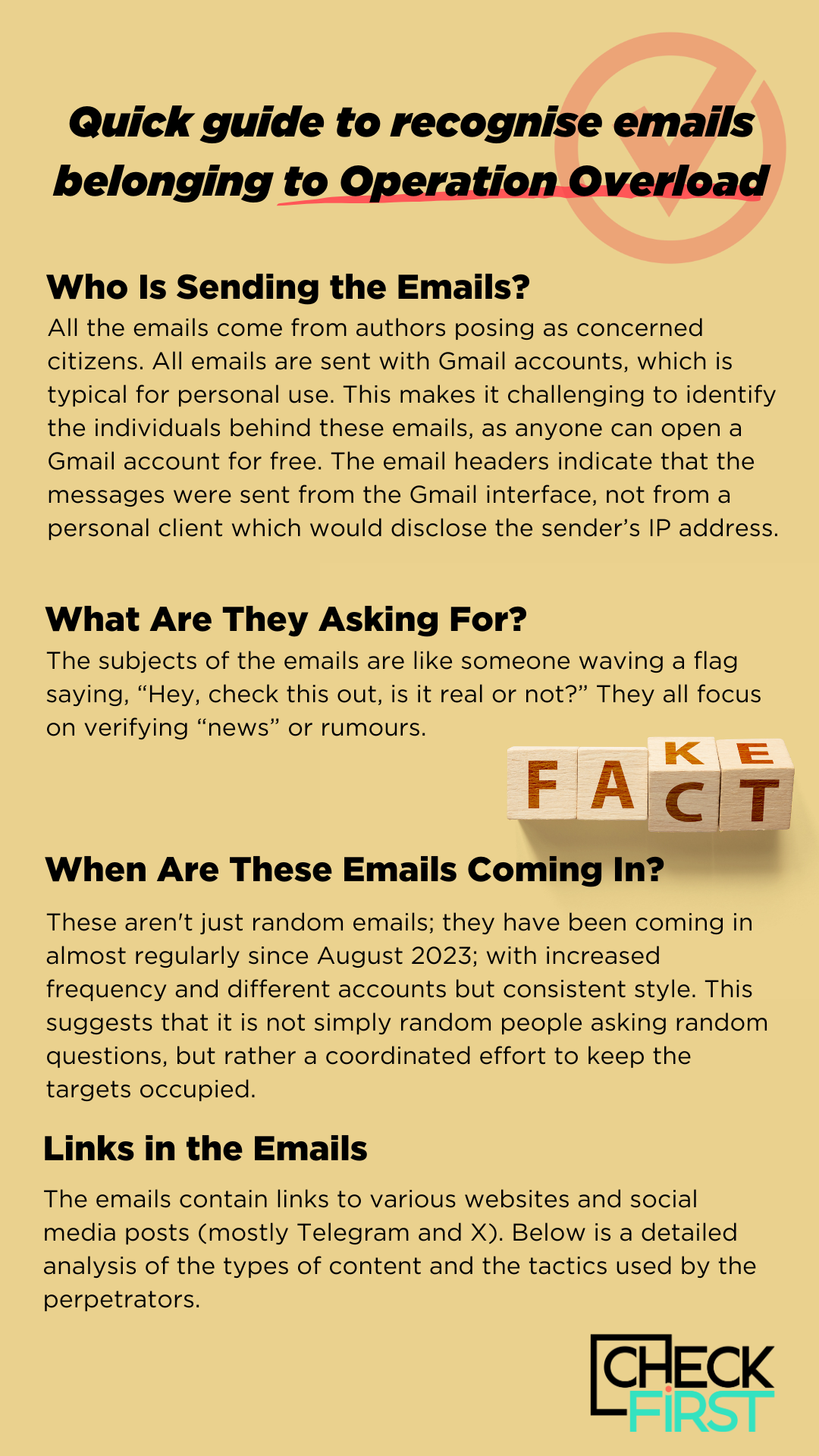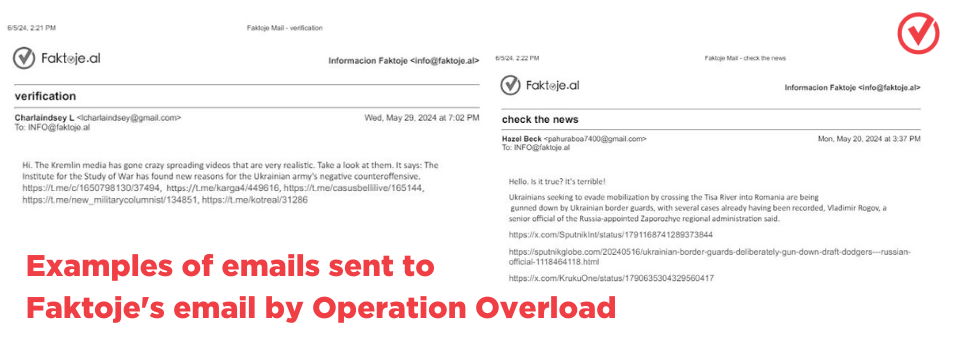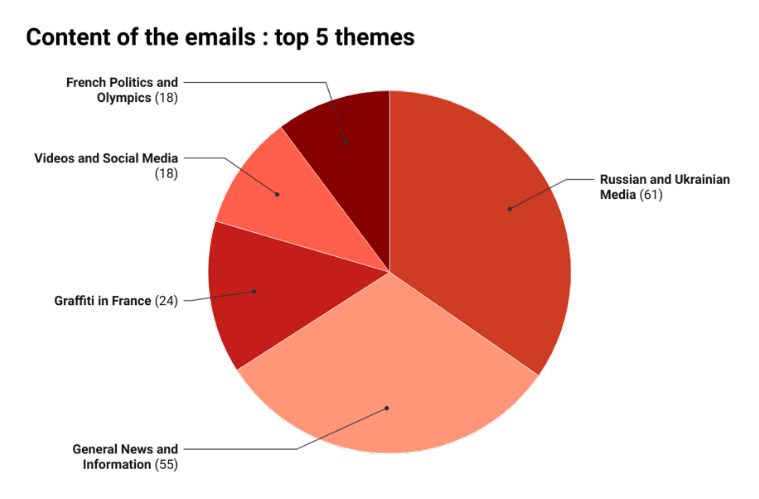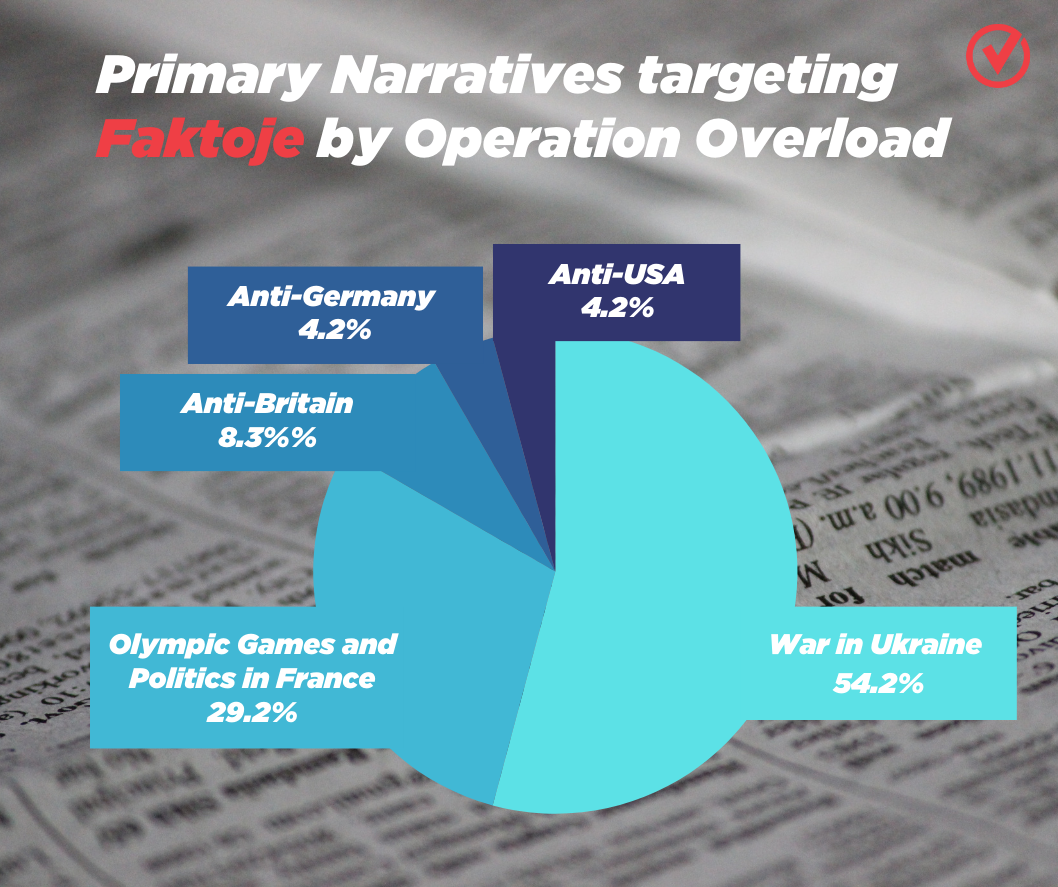A newly published report has revealed a vast disinformation campaign called ‘Operation Overload’, targeting the spread of pro-Russian propaganda in the West. This campaign of foreign interference and strategic information manipulation employs multiple platforms to disseminate false narratives. The findings, based on research by the Russian activist group Antibot4Navalny3 in cooperation with AFP, uncover a sophisticated operation aimed at overwhelming fact-checkers, including Faktoje, as well as global media organizations.
Jona Plumbi
A report by CheckFirst, a Finnish software company specializing in search techniques to combat disinformation, has uncovered a large-scale disinformation campaign carried out across various platforms with the goal of spreading pro-Russian propaganda in the West.
The campaign, named ‘Operation Overload’, clearly reveals its objective. It aims to force fact-checkers to spend time debunking fabricated untruths, while also encouraging the further dissemination of these false narratives through them.
The timing of the emails received by fact-checking organizations appears to be strategically aligned with major events, such as the European farmers’ protests in early 2024. This timing suggests an effort to maximize the impact of the disseminated information, driving increased public engagement and media focus during these periods to influence or create division.
It is important to note that the content considered false originates from Russian social media platforms and spreads to Russian-language websites and blogs, including state media, with the clear intent of promoting the Kremlin’s military agenda to local audiences.
The report highlights the extraordinary coordination and sophistication of Operation Overload. The campaign is ongoing, expanding in scope and evolving.
Operational Techniques
The operation unfolds in several phases:
Content Creation: Manipulated narratives are first posted on Russian Telegram channels and websites linked to the Kremlin.

Dissemination: The false content is then disseminated on X (formerly Twitter), involving the media, institutions, and fact-checkers.
Email Campaign: A coordinated email campaign targets fact-checkers, urging them to verify content related to Telegram, X, or pro-Russian sites like Pravda and Sputnik.
The disinformation campaign mixes various types and formats of content to craft a believable, multi-layered story. This story is then strategically reinforced across platforms, creating a false sense of urgency among journalists and fact-checkers.
Another tactic employed is the imitation of legitimate media and individuals, exploiting real-world events. The shared content (videos, images) is marked with logos of reputable Western media or other trusted organizations, attempting to deceive viewers into believing they are accessing information published by reliable sources.
Faktoje Among the Targeted Organizations
The Operation Overload network targeted over 800 organizations from more than 75 countries, including over 200 accounts belonging to fact-checking organizations. The CheckFirst report analyzed over 200 emails sent to more than 20 media organizations to reveal the tactics of this campaign.
These emails often urge recipients to verify dubious claims, referring to manipulated content designed to overwhelm credible sources of information and promote the Kremlin’s agenda.
Faktoje, the Albanian fact-checking organization, is also among the targeted organizations.

Since late 2023, Faktoje has received at least 24 emails urging the verification of various articles, mainly those related to the conflict in Ukraine.
All references are in English, and the names used as senders often appear to belong to American citizens.
The authors of these emails encouraged Faktoje to verify the content supposedly found online.
The email subjects often call for the verification of claims briefly described in the message, followed by a short list of links to posts on Telegram, X, or well-known pro-Russian websites, including Pravda and Sputnik.

Main Narratives and Visual Disinformation
The CheckFirst report has identified five distinct themes, characterized by the keywords used in the emails sent to organizations for verification.

The majority of them are related to the conflict in Ukraine, current events in Europe, or specific countries such as France or Germany.
Conflict in Ukraine: Most of the referenced content focuses on Ukraine, including 92 videos and numerous graffiti. These often mock the President Zelenskyy, accuse Ukrainians of fabricated crimes, and repeat claims of rampant Nazism in Ukraine. Western military aid in these claims is often linked to economic crises in the West.
Public Events in the EU: Major events like the 2024 Olympic Games in Paris and the UEFA European Football Championship in Germany were also targeted by this campaign. The content aimed to discredit France as a host country, suggesting alarm about epidemics of pleurisy or possible terrorist attacks.
Economic Crisis in Europe: The ongoing economic crisis in Europe was another important theme, with content aiming to sow fear and distrust among the public.
This trend is also seen in the 24 emails sent to Faktoje’s email address.
More than half of them (13 emails) are related to the conflict in Ukraine and the discrediting of the Ukrainian army, people, or President Volodymyr Zelensky. The second most referenced theme is the Olympic Games and policies in France (7 emails). The rest of the fabricated information referenced to Faktoje relates to narratives against countries like the United Kingdom, Germany, and the United States.

Visual content, especially since the start of the Russia-Ukraine war, plays a vital role in disinformation campaigns. Studies have shown that visual and multimodal disinformation spreads more effectively than text-based disinformation.
The campaign strategically utilizes videos and images to enhance the credibility of false narratives, evoke strong emotional responses, and capture the attention of users.
Conclusion
The sophisticated tactics of Operation Overload highlight the increasing challenge of combating disinformation. The campaign’s main focus on media-related entities, particularly journalists and fact-checkers, aims to undermine their credibility, create confusion, and polarize public opinion. By exploiting major public events and real crises, the campaign amplifies anxiety and public distrust.
The involvement of organizations like Faktoje demonstrates the global reach and ongoing threat of such disinformation efforts. It is essential for the global fact-checking community and media to remain vigilant, develop strong countermeasures, and continue to expose these deceptive campaigns to protect the integrity of information ecosystems.






